- What John Lennon Thinks of Donald Trump - November 14, 2016
- The Meaning of Fun: The Paul is Dead Rumor - February 3, 2016
- BEATLES-STREEP-SHEA SHOCKER: IT’S NOT HER!!!! - August 13, 2015
 DEVIN McKINNEY • One of my colleagues at Critics at Large, Toronto-based arts critic Deirdre Kelly, has scored a dynamite interview with Mark Lewisohn, recently in T-Town for a screening of the Hard Day’s Night re-release and a book-signing.
DEVIN McKINNEY • One of my colleagues at Critics at Large, Toronto-based arts critic Deirdre Kelly, has scored a dynamite interview with Mark Lewisohn, recently in T-Town for a screening of the Hard Day’s Night re-release and a book-signing.
The interview is both substantial and delightful, especially for we who so eagerly consumed Tune In last December, who still see its vivid pictures in our minds, still hear the hum of the history it reanimated. Lewisohn is just as engaged a subject as he is a writer, and Deirdre elicits much fascinating info about the research process he’s been following as “the world’s only full-time Beatles historian”—including the back-story behind the George Martin revelations.
And I must highlight—this being, by personal decree, The Year of Ringo—a casual Lewisohn phrase that puts better and more accurately than any word-tonnage why it is that Our Richard was not The Luckiest Man in History, nor even The Biggest Fool that Ever Hit the Big-Time: “It was right with him and wrong without him.”

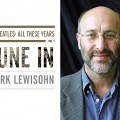
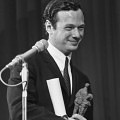
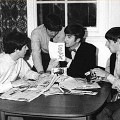
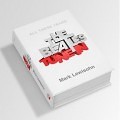

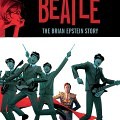


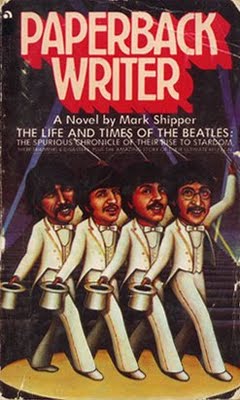
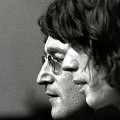

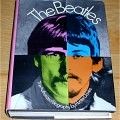
Awesome. Thanks so much for linking to this, Devin. I only wish it was longer! Like Mark with the Beatles, I find listening to Mark tell us the backstory to his books endlessly fascinating. It all gives me a bit of anxiety, however. People are dying away (Neil’s passing is a genuine loss for the next books and the Beatles story in general. He had so much more to share. So many little moments and stories that no one else was privy to and that I’m sure he didn’t share with anyone else.) and their history is fading for most. But I guess I can take solace in that the archives will be around forever, hopefully. I don’t think I’ve ever been more excited for something that is 15 years away.
Well said, Craig. Yes, the alignment of those numbers (Lewisohn’s age, and ours, against the projected publication timeline) puts a new and sobering perspective on … pretty much everything.
Yesterday I read the interview with Mark and thought how commercially well focussed he is in the interviews. Ever since the relase of ‘Tune In’ he quips the same old story about the contract, about Ringo, and the focus on documents instead of stories, etc. All this of course is well known from other interviews and the book. I bought the extended version (three copies), and passed by the shorter version. Maybe one day he will do an interview in which he elaborates extensively on the process of research and writing.
Mark Lewisohn today, is almost as inspiring a figure as The Beatles were way back when I was sleeping in the attic and mimicking my favorites rock-stars The Beatles and Creedence Clearwater Revival using the broom as an air-guitar or microphone.
Today in 2014 I was mimicking Mark Lewisohn.
It is summer holidays, and bound to be at home around those who need care and attention, and with the mountains far away I guess it is good time to check out ‘summer feeling good’ movies, with lots of music in it, and look at them the next few days. The re-release of “A Hard Day’s Night” in Blu-ray makes it an inevitable choice of visual and aural pleasure. During the afternoon rain in Amsterdam, after the self-serving version of the Gay-pride, I cower behind the computer screen. The summer breeze of the New York Times gives me access to all of the archives for free. I can’t resist to dig deep till I find numerous articles on The Beatles and the movie. I feel like a fan imitating the great researcher and author Mark Lewisohn. I wanna know what the folks in the USA thought of the movie, and into what time and culture exploded this movie, let’s do what he does at his home-office, digging deep into the vaults of Beatles history. Will I find a nugget that gives me a new perspective on The Beatles’ Story?
Soon I find a review of A Hard Day’s Night by the famous New York Times film-critic Bosley Crowther. A guy favoring non-English movies like those by Rossellini, Bergman, Fellini etc. whose writings as a reviewer could be overly mean. However his praise for The Beatles’ movie ‘A Hard Day’s Night’ was high and precise, and he wasn’t expecting that at all.
His review of August 12 1964 started with a phrase that sounded as a precursor excuse he had high praise for the movie:
“This is going to surprise you it may knock you right out of your chair but the new film with those incredible chaps, the Beatles, is a whale of a comedy.
“I wouldn’t believe it either, if i hadn’t seen it with my own astonished eyes, which have long since become accustomed to seeing disasters happening when newly fledged popsinging sensations are hastily rushed to the screen…
“A Hard Day’s Night”.. has much good humor going for it that it is awfully hard to resist.
“In the first place, it’s wonderfully lively and altogether good-natured spoof of the juvenile madness called “Beatlemania,” the current spreading craze of otherwise healthy Young people for the four British lads with the shaggy hair”
Crowther in 1964 is an old fashioned guy who doesn’t believe anything at all about what he sees about The Beatles in the papers and on the Ed Sullivan Show, probably just like millions other citizens in the USA and Western Europe. He didn’t expect it to ever become a serious thing, and apparently thinks the Beatles are merely a ‘craze’.
But as a specialist movie reviewer he saw what was good and wrote it specifying and illuminating aspects and characteristics of the movie we can still recognize in the movie fifty years on.
He describes the opening scene of The Beatles ‘running ahead of a mob of howling admirers chasing after them’ he misses that one of the boys staggers and stumble toward his assured lynching fate… a horror aspect that goes unnoticed for many. One wonders is it because of the music and the happy good-natured juvenile madness the movie was about? Or was Beatlemania never aggressive as Paul McCartney suggested in ‘Anthology’:
“It wasn’t frightening – we never seemed to get worried by crowds. It always appeared to be a friendly crowd; there never seemed to be a violent face.”
Typical for The Beatles as artists was the way they dealt with reporters during their press-meetings, Crowther didn’t know but enjoys the scenes:
“All the way through the picture there are frenzied episodes of the Beatles’ encounters with squeling fans and with reporters who ask silly questions, all in a facile, witty vein.”
He displays high professional praise of the producers, director and writers of the movie.
“It’s a fine conglomeration of madcap clowning in the old Marx Brothers’ style, and it is done with such a dazzling use of camera that it tickles the intellect en electrifies the nerves.
“This is the major distinction of this commercially sure-fire film: It is much more sophisticated than its seemingly frivolous matter promises. With practically nothing substantial in the way of a story to tell (…) it discovers a nifty little satire in the paradox of the old man being more of a problem, more of “a troublemaker and a mixer,” than the boys.
“ ‘e’s a nice old man isn’t ‘e’?” notes one of the fellow when they first meet Granddad on a train. And another replies, with courteous unction, which parodies the standard comment about the Beatles themselves, “’e’s very clean.”
My guess is that Crowther was right in concluding that the story line of the old man was the troublemaker, but very clean and The Beatles the establishment, the ones it was all about,
“may be too subtle for the happily squeling kids who will no doubt be its major audience”.
My guess is most of the Blu-ray viewers will miss the pointe as well. Regardless of time and viewers’ age Crowther sensed
“everybody will be able to enjoy the rollicking, madcap fun.”
Like I said before Crowther’s praise for the movie makers is high.
“It comes in fast-flowing spurts of sight gags and throw-away dialogue that is flippeda bout recklessly. Alun Owen, who wrote the screenplay, may have dug it all out of his brain (we know better, don’t we!), but Richard Lester has directed at such a brisk clip that it seems to come spontaneously.
“… one musical sequence (…) when the boys tumble wildly out of doors race eccentrically about a patterned playground to the tune of their song “Can’t Buy Me Love,” hits a surrealistic tempo that approaches audio-visual poetry.
“…pictorial compositions that suggests travestiesor, at least, intelligent awareness of the absurdity of the Beatle craze.”
Crowther had no idea one of the best thinking minds in showbiz at the time, Brian Epstein, was behind the successtory of both movie and the band. Like so many others it was too good to be true and to take serious. So Crowther closing paragraph was:
“It is good to know there are people in this world, up to and including the major parties, who don’t take the Beatles seriously”
Crowther like so many other of his colleagues critics and average Americans underestimated the lasting power of what Lennon described in 1980 as
“the sexual equivalent of the beginning hysteria of a relationship”.
Looking back in time from 2014 it is quite a feat that the first film of The Beatles is still nr. 8 in the Top 100 best reviewed Movies of All Time based on the Tomator Score. Amazing.
It is good to see art for arts’ sake, comedy for a good laugh, Beatles’ films for the music and the lads, and having a perspective of the (cultural and sociological) times it was produced in is as fascinating. Thanks Mark, sorry I don’t have the archive digger’s stamina you need to gives us those big wonderful volumes (please, make it IV and include post 1970 activities) of ‘The Beatles All These Years’. When the summer is over and the darks become shorter, darker and colder I will sign up to a course for online archive diggers, I wanna be like Mark Lewisohn.
Tomorrow I will have fun with the movie ‘A Hard Day’s Night’. Think of a barbecue with good old inspiring rock ’n roll Music and when it gets dark, we’ll beam the happy ‘A Hard Day’s Night’ for all the guests, and I will turn up the volume when The Beatles play ‘I Should Have Known Better’ during the train scene. Then I will wander off in my mind thinking of how George Harrison pulled it off that Pattie Boyd dumped her before she gave in to handsome George for a dinner date with George and patron Brian Epstein. Pattie is in that movie one of the crowd of ‘little girls in gym-slips, who were actually models’ as Macca said somewhere.
Not for nothing did Roger Ebert call AHDN “the Citizen Kane of juke box musicals.”
.
Back in the 1970s, when I was a nervous adolescent (rather than the fine, mature gentleman I am today) I spent hours in my local library, combing through old magazine archives. I read Time, Newsweek, Look, Life, as well as the NY Times from 1963-1964-1965, in search of the old journalists’ opinions of the fab four.
.
Most of what I read was amused condescension, the way smart people nowadays dismiss Justin Bieber and Lady Gaga. “Mops of unruly hair, bursts of improbable harmony, noisy guitars and drums.” The chain-smoking suit-and-bowtie boys at the big magazines saw the Beatles (what a silly name!) as a joke, a passing fad.
.
I agree Justin Bieber is an asshole, but who knows if Lady Gaga will end up writing the great American songbook? Did the boys at Time magazine think Paul would be filling arenas in 2014?
Not to burnish the long dead at the expense of the recently dead, but it was actually Andrew Sarris, in his original Village Voice review, who made the comparison of Hard Day’s to Kane. Ebert was quoting it, as why shouldn’t he have: It’s indeed one of the most quoted lines I know of in Beatle or Beatle-related lit. See here.
I think my favorite part of this was ML sharing that Philip Norman has hassled him over his comments about Shout! (Anybody know details?)
The idea that Norman — or any other writer — could’ve gotten the story right in 1981 is laughable; it’s a journalist’s conceit to even entertain such an idea. As Lewisohn clearly demonstrates, the Beatles’ story requires the tools of the historian, arranging the facts and contemporaneous information unearthed and preserved by journalists.
Lewisohn really had to tiptoe around that question about Norman, and says so: “I need to be delicate here.” Reading between the lines, it sounds like Lewisohn had made a comment along the lines of “Shout!” not being the definitive Beatles history. And if Norman’s offended by that, it only adds to my despair at the prospect of his McCartney biography.
I loved that Lewisohn said “Well, when I was less mature, I did want to correct other people’s errors. Errors always offended me, particularly when they resulted from laziness. And I had always wanted to correct other people’s errors. But I’ve grown up, a bit, since then, and with these three books I’m writing, I’m not interested in correcting anything. I’m just telling the story from the beginning. I am starting fresh. And along the way, I am debunking myths right, left and centre. But I am not pointing out what they are, because it is not relevant.”
I can only aspire to that level of maturity myself!
@Nancy, this was exactly my thought as well:
And if Norman’s offended by that, it only adds to my despair at the prospect of his McCartney biography.
If Norman’s that much of a narcissist, it explains many of the flaws (and strengths) of his work.
There’s a story that McCartney used to refer to Shout! as Shite! by Norma Philip. Earlier in the year I saw ML speak at a literary festival and the subject of Shout! came up. Mark’s a gentleman and doesn’t tend to badmouth other people, but he did tell the crowd the Shite! anecdote with no small amount of glee. I thought it was a little out of character, so I wonder if that’s what Norman objected to.
@Joe, that’s a great anecdote. That’s the Paul Mc I always hope is lurking behind the thumbs-up Macca.